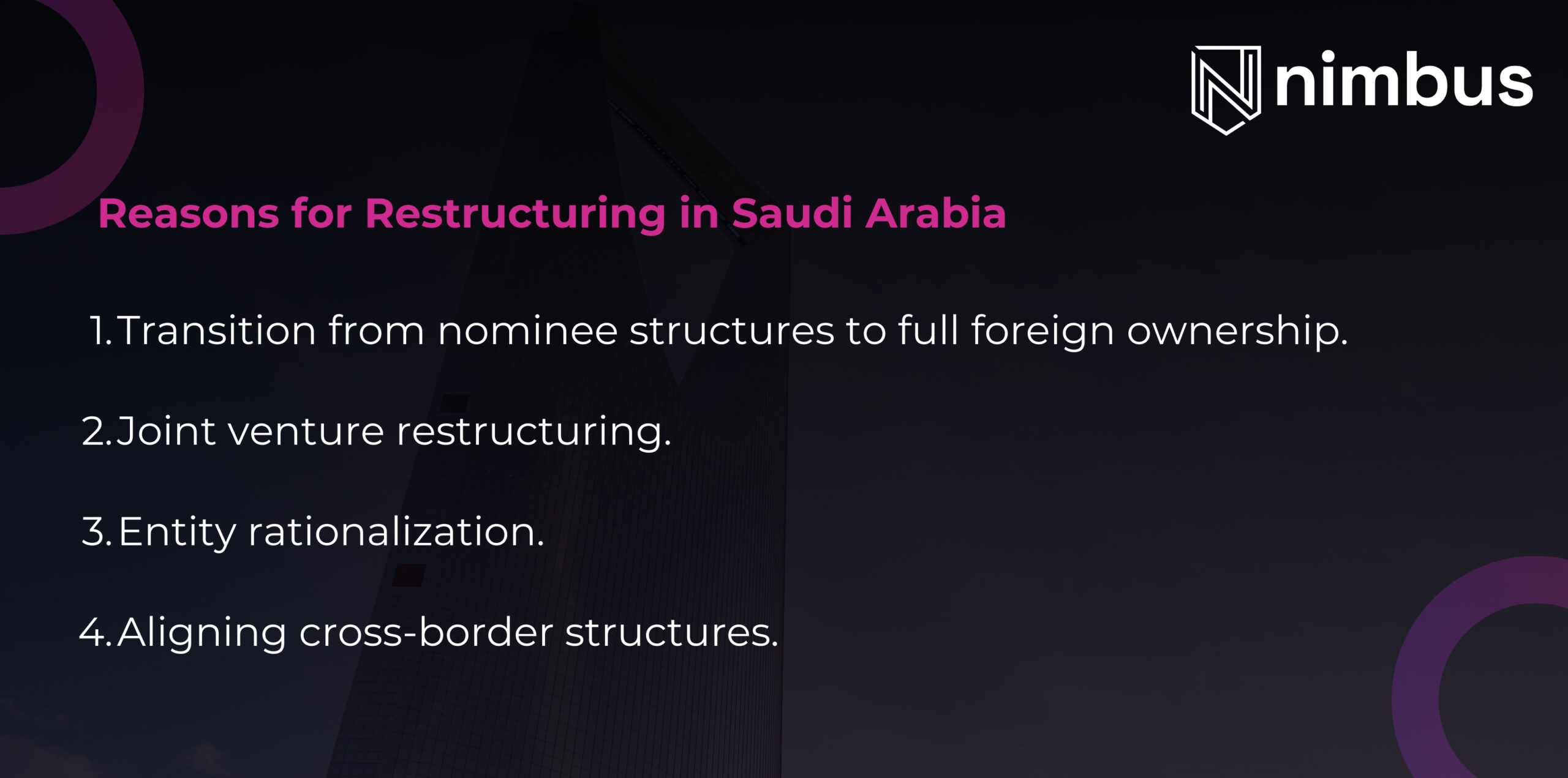Saudi Arabia’s Vision 2030 is transforming the Kingdom’s economy, opening doors to new industries, international investment, and an increasingly competitive market.
With this transformation comes greater regulatory scrutiny, higher compliance standards, and more pressure on businesses to ensure their structures are not only legally sound but strategically aligned for the future.
In the past, restructuring was often viewed as a legal formality or a tax-driven necessity. Today, it has evolved into a strategic tool that can enhance efficiency, strengthen governance, and inspire investor confidence.
For companies already established in the Kingdom, and for those pursuing new opportunities through business setup in the KSA, restructuring is becoming a vital step toward sustainable growth.
– Why Restructuring in Saudi Arabia Is a Strategic Necessity?
Business setup in Saudi Arabia has always required careful consideration of legal, operational, and ownership structures. But under Vision 2030, the stakes are higher. Investors, regulators, and even business partners are paying closer attention to compliance and long-term strategy.
Restructuring is no longer about reactive measures; it is about proactively preparing for growth, raising capital, or entering new markets. The main triggers for restructuring in the Kingdom include:
- Regulatory reforms such as the Anti-Concealment Law.
- Bringing new investors on board.
- Addressing governance or partner conflicts.
- Eliminating inefficiencies in tax and compliance.
- Expanding across GCC markets or beyond.
– Reasons for Restructuring in Saudi Arabia

Transition from nominee structures to full foreign ownership.
With the Anti-Concealment Law, legacy nominee arrangements are no longer acceptable. Many foreign investors are transitioning to legal ownership structures approved by the Ministry of Investment (MISA). This change is reducing risk and increasing transparency, but it also requires careful handling of compliance and valuation issues.
Joint venture restructuring.
Many businesses in Saudi Arabia operate through joint ventures. Over time, informal agreements, ambiguous contracts, or underperforming partners create inefficiencies and risks. Redrafting joint venture agreements ensures legal precision, fair profit-sharing, and a structure that supports long-term viability.
Entity rationalization.
Some companies hold multiple commercial registrations, dormant branches, or unnecessary licenses. These redundancies increase costs and can lead to tax leakage. Rationalizing entities through mergers, closures, or spin-offs simplifies operations and reduces inefficiency.
Aligning cross-border structures.
It is still common for Saudi subsidiaries to be managed under a UAE or offshore holding company. However, lack of alignment in governance and Ultimate Beneficial Ownership (UBO) declarations across jurisdictions exposes businesses to regulatory review.
Clear, compliant cross-border structuring is critical to avoid challenges with ZATCA (tax authority) and the Ministry of Commerce.
– Restructuring Options: Legal and Operational Tools
When companies begin restructuring, they typically explore several tools to update or improve their structure.

Changing shareholder structures.
This may include adding or removing shareholders, consolidating ownership under a parent holding, or aligning UBO disclosures across regulators.
Converting the legal entity.
Some businesses choose to convert from a sole proprietorship to a limited liability company (LLC) or a closed joint stock company. This transition enhances governance, creates access to capital, and provides a structure better suited to growth.
Mergers and spin-outs.
Mergers often require approval from the Ministry of Commerce and ZATCA, as well as clearance of tax liabilities. Spin-outs are useful when companies want to separate business units, divest certain operations, or attract new investment into a standalone unit.
Reconfiguring joint ventures.
Revisiting shareholder agreements ensures that equity splits, decision-making powers, and board structures remain aligned with current realities and future growth. Updating these agreements helps avoid conflicts and ensures compliance with Saudi governance requirements.
Liquidation and re-incorporation.
In some cases, old or non-compliant structures may need to be dissolved and re-formed under a new entity. While this path can be complex due to tax implications, employee transfers, and asset allocation, it may be necessary for companies that want a clean start.
– Key Considerations Before Restructuring
Restructuring is not a decision to take lightly. Companies should carefully evaluate their legal, financial, and operational positions before moving forward. Some key considerations include:
- Conduct a due diligence review of all compliance and tax obligations.
- Assess whether the current entity structure supports long-term strategy and growth.
- Consider whether alignment across GCC or international holdings is required.
- Evaluate the tax consequences of restructuring, including VAT grouping and transfer pricing.
- Work with trusted advisors to avoid unnecessary disruption during the transition.
– Strategic Restructuring: Plan Ahead, Don’t React
The most successful restructuring projects in Saudi Arabia begin with a clear plan and a proactive mindset. Rather than waiting until regulators or investors flag an issue, companies should take the initiative to align their current structures with their future goals. Some key steps include:
- Reviewing outdated partner agreements and documentation.
- Cleaning up dormant entities or redundant licenses.
- Auditing compliance with ZATCA, the Ministry of Commerce, and labor regulations.
- Developing a timeline that minimizes operational disruption.
– The Role of Professional Advisors
For companies considering Saudi business setup or restructuring, professional advisors play a vital role. Advisors help businesses:
- Navigate compliance across regulatory bodies.
- Structure entities to support investment or joint ventures.
- Manage tax implications and minimize risk.
- Align cross-border holdings with KSA regulations.
Whether you are pursuing KSA company formation for the first time or updating an existing structure, expert support ensures smoother processes and fewer surprises.
– A Clean Structure Builds Confidence
In today’s fast-changing Saudi economy, restructuring is a strategic necessity that helps companies stay compliant, attract investors, and prepare for long-term growth.
For businesses already operating in the Kingdom, restructuring offers a chance to simplify ownership, reduce inefficiencies, and align with Vision 2030 objectives.
For new entrants considering business setup in the KSA, starting with the right structure from day one can save both time and cost in the future. A clean, compliant structure inspires trust and creates the foundation for sustainable success.



